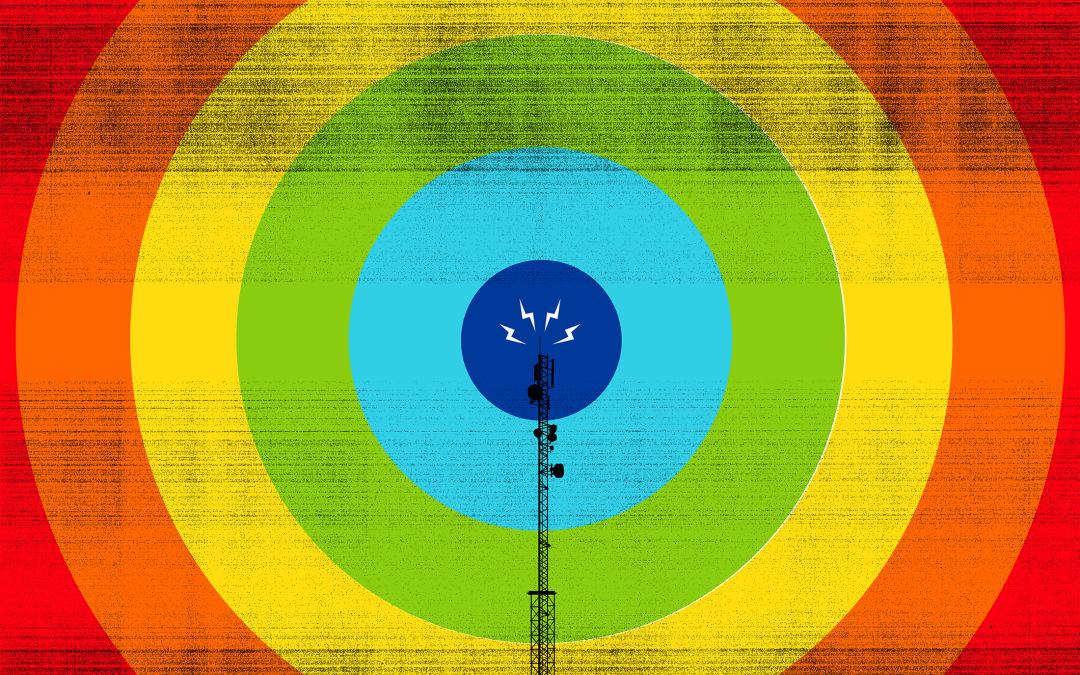Listening to Hope and History with KPFT’s Queer Voices

Image: Todd Urban
There’s an empty lot on Lovett Street, between the Alliance Française and a small row of brick townhouses. It’s fenced in, overrun with tall grasses and inviting speculation on whether anything will ever populate the space again. Perhaps it’s doomed to the same empty, liminal fate as the former sites of Disco Kroger, Half Price Books, and 3-6-9 Oriental Bistro: a symbol of developers tearing Montrose history down and leaving naught but bald patches behind where once Houston’s queer community could thrive on its own terms.
90.1 KPFT, Houston’s Pacifica Radio affiliate, once called the neglected Lovett lot home. It occupied a rickety two-story yellow house—often decorated with murals—and proudly displayed what remained of the broadcasting equipment that was bombed by the Ku Klux Klan in 1970. The station gave local LGBTQ+ voices a platform right as the queer liberation movement was kicking off. The show Queer Voices continues to defiantly dominate the airwaves, though the historic KPFT space has long been reduced to splinters and dust—coinciding with the rights, dignity, and public health of the queer community getting stripped on multiple legislative levels.
“KPFT is celebrating its 55th year of operation. I’ve been a listener all that time. There was queer radio almost from the beginning,” says Deborah Moncrief Bell, who cohosts Queer Voices alongside Brett Cullum and Davis Mendoza Darusman. “Ray Hill was involved, of course, in the first show that I know of. We believe that we’re the longest running queer radio show in the country.”
Queer Voices began life as Wilde ‘n’ Stein (named after queer authors Oscar Wilde and Gertrude Stein) in 1975, five years after the Stonewall riots. LGBTQ+ rights and prison system reform activist Ray Hill served as its first host, with Mike Miesch, Jack Valinski, and Bell eventually joining in. The University of Houston maintains an archive of 41 episodes dated between 1979 and 1992, offering a snapshot of how queer Houstonians lived and discussed the major news stories impacting their community. There’s a 1984 episode on the assassination of Harvey Milk, who became California’s first openly gay man elected to public office when he was voted into the San Francisco Board of Supervisors in 1977. Another episode comes to listeners live from the city’s Pride parade in 1990.
Bell came onboard as cohost in the early 1980s, around the time she first embraced the lesbian aspect of her self-described “bisexual lesbian” identity.
“When I came in, it was Jack Valinski [as host], and Ray was still somewhat involved. We’ve always thought of [the show] as a collective, so different contributors make up the core group,” she says. “And every now and then, we’ll have a special person, someone that offers something, contribute.”
Wilde ‘n’ Stein was canceled in 1992, but KPFT listeners clamored to have another LGBTQ+ show on the air. Lesbian & Gay Voices—also archived at UH—debuted that same year, and kept its predecessor’s format even after rebranding as the more inclusively named Queer Voices in 2002. The show, no matter its name, has always featured guests who discuss timely LGBTQ+ topics and lived experiences, including perspectives beyond those of the hosts. Gender and sexuality are spectrums, not straight (pun intended) lines, and other backgrounds like disability, race, and class can all impact how an individual navigates their queerness.
“We try to make sure that there’s representation from all aspects of our community,” Bell says.
Recent guests include Broadway star D. Jerome, who plays the Tin Man in the current national tour of The Wiz; Lesbians of Color founder Kendra Walker; Alley Theatre playwright Isaac Gómez; and intersex activist and artist Mo Cortez. They’ve welcomed local political trailblazers Phyllis Frye, the first transgender judge in the United States, and former Houston mayor Annise Parker, an out and proud lesbian. Bell has also interviewed Joan Jett, Alexandra Billings, and Hannah Gadsby.

Image: Photo Courtesy of J.D. Doyle
Queer Voices, in all its incarnations, has always served as a first-person insight into the political and social changes shaping the LGBTQ+ community. Listening through the archives is one of the most valuable investments in learning about Houston’s extensive queer history. Bell, Hill, and the other hosts were and are activists both inside and outside the recording booth, spreading messages of solidarity and education alongside the basic human rights owed to all LGBTQ+ peoples.
“We were kind of a lifeline back in the day, in the ’80s, with people who were not out yet, and especially young people. They could turn on the radio and they could hear positive voices about being a gay, lesbian, or however you identify,” Bell says. “We have been part of the progress, I believe, because we did always have that approach of sending a positive message.”
At the height of the AIDS crisis, Bell and fellow queer activists taught Houstonians about safe sex. They’ve collaborated with the Houston LGBTQ+ Political Caucus to endorse queer-friendly, if not themselves openly queer, representatives. They show up at the Pride parade every year to serve as commentators. Thousands of Houstonians tune in to both the live broadcast and the downloadable podcast version that the team posts right after. Listeners come from almost every continent because of this accessibility, something producer Bryan Hlavinka has on his mind regarding the future of Queer Voices.
“Radio seems to be kind of a dying media source, so I see [the show] shifting to a streaming podcast exclusively in some point in the future,” he says. “Not ready to say goodbye to KPFT yet, but I think that’s on the horizon.”
Regardless of whether the show pivots to a full-time podcast or maintains its radio-and-a-podcast strategy, continued access to such a resource is essential in the current global climate. As the past decade of progress in LGBTQ+ rights are beginning to erode internationally, Queer Voices and other programs serve as a beacon of hope against the encroaching darkness.
“I feel like we’re living in 1930s Germany, or Gilead from The Handmaid’s Tale,” Hlavinka says. He married in 2021 and expresses concern that his union may be legally overturned if political hostilities against queer people continue.
Much as it did in the 1980s, at the height of the AIDS epidemic and subsequent abandonment by the Reagan administration, Queer Voices can serve as a clarion call providing support. It can spread information on how the LGBTQ+ community has historically handled its worst moments, providing insight into fighting back to protect civil rights. And this time, it can reach beyond the KPFT airwaves to reach the ears of queer people and their allies anywhere in the world. That’s a powerful platform.
“What I’ve always thought is important about Queer Voices is not just that we celebrate and showcase what queer people in Houston are doing—the various events, the politics, the cultural matters—but we have been a way to document it,” Bell says.




